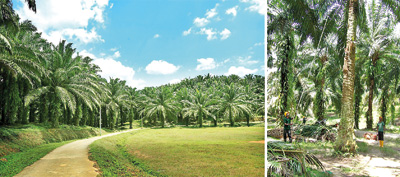Many Lankan oil palm companies seeking sustainability certification
View(s):Sri Lankan companies cultivating oil palm or processing palm oil are committed to achieving certification of their sustainability practices, similar to the Roundtable on Sustainable Palm Oil (RSPO) certification obtained by Watawala Plantations PLC, the Palm Oil Industry Association (POIA) said this week in a media release.

File pictures of oil palms
Congratulating Watawala Plantations for becoming the first plantation company in South Asia to be awarded the prestigious RSPO certification, POIA President Dr. Rohan Fernando said it is particularly noteworthy that the company’s palm oil plantations are in Udugama, Galle, the cradle of the local oil palm industry, where cultivation began more than 50 years ago.
“RSPO certification is not granted to an operation that is damaging to the environment and Watawala’s achievement of this global standard bears out what the industry has repeatedly emphasised, that oil palm can be and is being grown responsibly in Sri Lanka, contrary to the unsubstantiated claims made by activists,” Dr. Fernando said, in the association statement.
“Obtaining this certification is not easy,” he noted. “We are aware that it took Watawala Plantations eight years to be RSPO accredited, and that the process began well before the start of the current agitation against the industry. The company has invested substantially in terms of time and money to meet the extremely stringent global standards specified for RSPO certification.”
“Besides Watawala Plantations, AEN Palm Oil Processing, a joint venture between three plantation companies, has also received RSPO certification for its factory, and we are aware that many other members of the POIA are in the process of obtaining internationally-recognised sustainability certifications, despite the adversity they are facing,” Dr Fernando said.
RSPO certification is an assurance to the customer that the standard of palm oil production is sustainable. Sustainable palm oil production is comprised of legal, economically viable, environmentally appropriate and socially beneficial management and operations. At the heart of RSPO certification are the RSPO Principles and Criteria for Sustainable Palm Oil Production, the global guidelines for producing palm oil sustainably.
The POIA encourages all member companies to adopt Good Agriculture Practices (GAP) because the association’s objectives go beyond campaigning for the expansion of sustainable oil palm cultivation in Sri Lanka, Dr. Fernando added. “Some of Sri Lanka’s most respected business conglomerates have invested in the palm oil industry and are committed to building an environmentally-responsible and socially sustainable business that will enable Sri Lanka to reduce the import of edible oils and the huge outflow of foreign exchange,” he said.
The POIA represents cultivators as well as refiners, processors, manufacturers, marketers and sellers of palm oil and other products of the oil palm, who have cumulatively invested Rs. 26 billion in the industry. Sri Lanka has less than 11,000 hectares under oil palm – just over 1 per cent of the extents under tea, rubber and coconut – and plantation companies had been mandated by a government decision in 2014, to increase the total area under oil palm to 20,000 hectares under strictly-enforced guidelines that ensure the industry is environmentally non-invasive.


